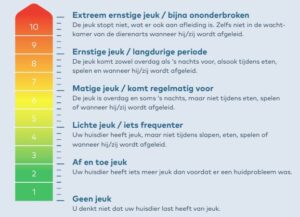Dogs or cats with seasonal allergies
It’s almost autumn: the leaves are falling from the tree, the fireplace is lit and… my pet is allergic!
It certainly could be. If you notice that your dog or cat has recurring symptoms during certain seasons (spring, summer and early autumn), it is quite possible that he or she suffers from a seasonal allergy, also called atopy.
An allergy is a condition that may involve hereditary factors and manifests as hypersensitivity to common substances that are harmless to most animals. The immunological mechanisms underlying allergies in dogs and cats are the same as in humans. In most pets, the first allergic symptoms appear between the 1st and 3rd year of life, but it can occur at all ages.
There are five main types of allergy:
- Atopy or atopic dermatitis: Hypersensitivity to pollen, mites, molds and dander
- Food allergy: Hypersensitivity to protein components of the diet, e.g. chicken
- Insect and flea allergy: Hypersensitivity to insect and flea saliva
- Contact allergy: Hypersensitivity to materials such as plastic, linoleum and paint
- Drug allergy: Hypersensitivity to antibiotics, antiparasitic drugs and other medicines
What are the symptoms of allergy in my pet?
The most common complaint with atopy is itching, which can often cause annoying skin problems. If this is the case, your pet will scratch, bite and chew its skin, rub its head along the wall or on the ground, or wash itself frequently. There is also a chance of (temporary) hair loss and recurrent ear infections. Places where itching is common are on the belly, paws, base of the tail, head – especially around the eyes, mouth and ears. Sometimes watery eyes, sneezing and coughing are observed.
How do I know if my pet is allergic?
Besides allergy, there are many other causes of itching and scratching. Atopy is diagnosed, if all other skin conditions with similar symptoms (including food allergy) have been ruled out and if allergic symptoms are still present. Through a blood test, we can see which substances your dog or cat is having an allergic reaction to. Once we have found out exactly what your pet is allergic to, we will look at treatment appropriate to the severity of the symptoms.
How to treat allergy in your dog or cat?
The most effective treatment for atopy is strict avoidance of the allergens responsible for the symptoms. In most cases, however, this is impossible, as it is difficult not to come into contact with pollen or dust mites. There are a number of medications that help control your pet’s allergic symptoms in the short term. These medications are a good option to control itching. However, they do not treat the cause of the allergy. This means your pet will remain allergic and the immune system will still react to allergens. Also, many of these medications have side effects and can ‘mask’ other health problems, making them harder to diagnose and treat (e.g. ear infections).

Currently, the only treatment that addresses the cause of atopy is allergen-specific immunotherapy. Immunotherapy is a medical treatment in which very small amounts of allergens to which your pet is allergic are injected subcutaneously. The aim is to change the immune system’s response so that it becomes less sensitive or even insensitive to these allergens. This will reduce or eliminate the allergic reaction. Immunotherapy is safe and effective and can be used long-term. If you would like more information about this, please contact us.
What can I do to help my pet with atopy?
There are a number of actions you can take as an owner to reduce your pet’s symptoms with atopy.
Hygiene at home
Pollen unfortunately often finds its way indoors. Through open windows, doors, your clothes, shoes, and via your pets themselves. You can never completely prevent it, but complaints can certainly be reduced by keeping your house clean. Think about vacuuming more often, patting your carpet and washing your curtains.
Wash
Gently washing your pet to remove pollen and mites can certainly help and is also very pleasant to do together every now and then. Special hypoallergenic anti-itch shampoos are available for this purpose.
Consistent flea control
Proper flea control is important for every dog and cat, but if your pet has an allergy, it is extra important to prevent flea-induced itching. Therefore, be extra keen on this.
Good nutrition
Because an allergy can cause major skin problems, it is also wise to make sure your dog or cat gets high-quality food that contains specific nutrients that promote healthy skin. We can tell you which food is most suitable for your pet.
If you feel that your pet has symptoms matching the above description, don’t hesitate to contact us!


